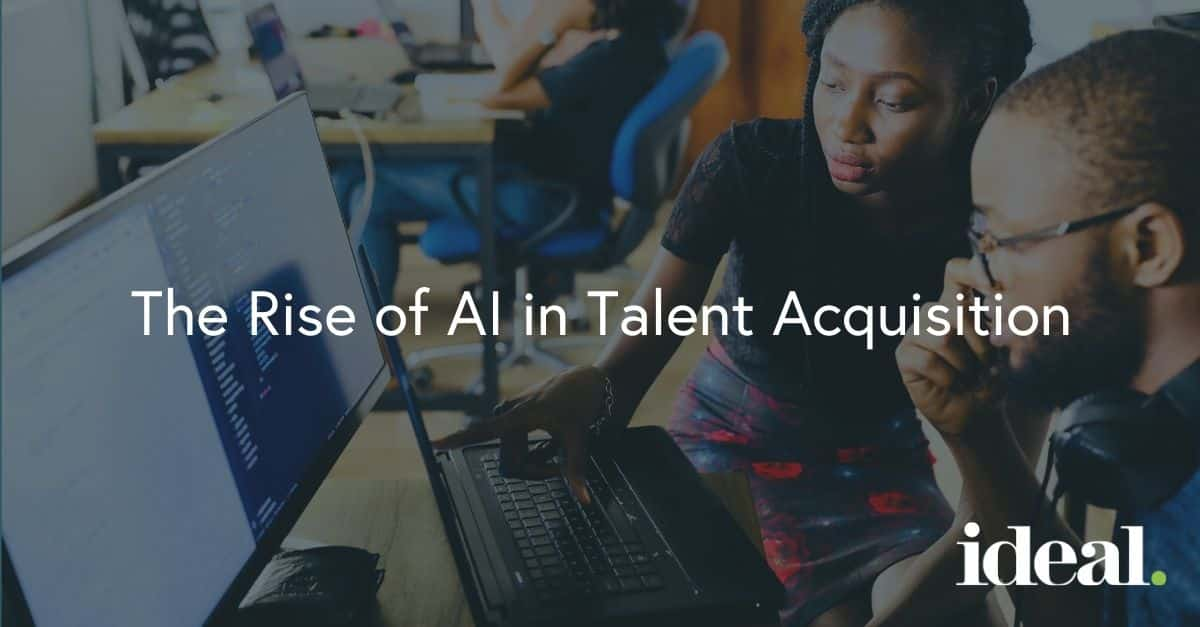For almost a decade now, the use of artificial intelligence (AI) in hiring practices has gained incremental traction.
The overwhelming adoption of AI can be tied to its many benefits which center around making recruitment easier, more accurate, and efficient. AI enables recruiters and hiring managers to assess and interview candidates with much more ease compared to traditional methods. Research also shows that 96% of HR managers believe AI can improve talent acquisition and retention significantly.
For the last several years, finding the right candidate in high demand talent pools has been highlighted as one of the biggest obstacles to attracting top talent (LinkedIn Global Recruiting Survey 2016), and AI has evolved accordingly to help solve this problem. Implementing artificial intelligence in talent acquisition goes beyond accessing candidate data, but rather leveraging it at scale —helping companies find the best candidate for the job.
Note: AI technology in talent acquisition has transformed and improved many traditional processes but human interaction is still essential.
What is Artificial Intelligence?
Before diving into AI in talent acquisition let’s cover the basic definition. So, what is AI? Artificial intelligence is a branch of computer science, and it refers to the simulation of human intelligence by programmed machines. AI has the ability to take large volumes of data that a human couldn’t possibly process, and turn it into actionable information.
Here are some of the major use-cases of AI in recruitment:
1. Candidate Sourcing
AI can sophisticate the process and outcomes of candidate sourcing. Due to its ability to process data at scale, the reach is broader and the process of building talent pools, faster. For example, about 300 million profiles can be crawled online fairly quickly. AI, therefore, can contribute to removing the difficult and time-consuming task of sourcing for candidates on social media, job boards, or checking online resumes.
2. Candidate Screening
It’s easy for recruiters to miss out on potential candidates if they are dealing with thousands or even hundreds of them per job. These applicants may be in the pool, but due to the mere volume, it becomes difficult to find every singly strong prospect. AI helps talent acquisition teams by fully screening the applicant pool, and accordingly scoring on their potential fit. The latter saves recruiters countless screening hours while providing more time to focus on top talent. AI can also help increase candidate engagement, by automatically sending chats, emails, assessments, and next steps.
3. Posting Jobs
AI has enabled employers to run more targeted ads that yield better results. Programmatic advertising is used today to display targeted ads to the right candidate audience. Highly targeted ads are made possible using the prospect’s professional interests (LinkedIn), cookies, and demographics. Cookies, for instance, reveal the type of jobs potential candidates were most interested in upon visiting career and job posting pages.
4. Hiring Remote Workers
Remote work adoption has boomed for over a decade. In the US, for instance, over 4 million people work remotely. When running a fully remote recruiting process companies can leverage AI tools to assess the skill, personality, and competency of a candidate.
5. Diversity Hiring
AI recruiting solutions contribute to diverse hiring by eliminating basic bias factors that a human would almost always subconsciously sustain. AI can be configured to ignore gender, age, and race when assessing profiles thereby fairly screening candidates. It is well known that building a diverse workforce provides organizations with several benefits, spanning from increased creativity and innovation to employee productivity and retention.
6. Data Collection
AI recruiting chatbots and assistants provide a seamless and efficient way to gather data from candidates. Important application details and screening questions can be collected via chatbot and instantly shared with recruiters and saved to the job application. Automating the process of simple screening questions can save talent acquisition teams the long process of sending emails, and calling or texting. All of which, can have a positive impact on candidate experience.
7. Onboarding
Certain administrative tasks in the offer and onboarding stage of the employee lifecycle need to be conducted repeatedly and as such, can require HR bandwidth and resources. AI can help automating mundane tasks like creating templates for offer letters, handling background checks, organizing employee records, and delivering onboarding paperwork.
Conclusion
The rise of AI in talent acquisition is evident, especially amongst companies that prioritize the quality of their hires, workforce diversity, and recruiter efficiency. In just a few years, AI and sophisticated machine learning technologies have helped reduce recruiting costs and the time-consuming task of screening candidates. Which leaves us expectant on its future contributions to the talent acquisition world.
The post The Rise of AI in Talent Acquisition appeared first on Ideal.
